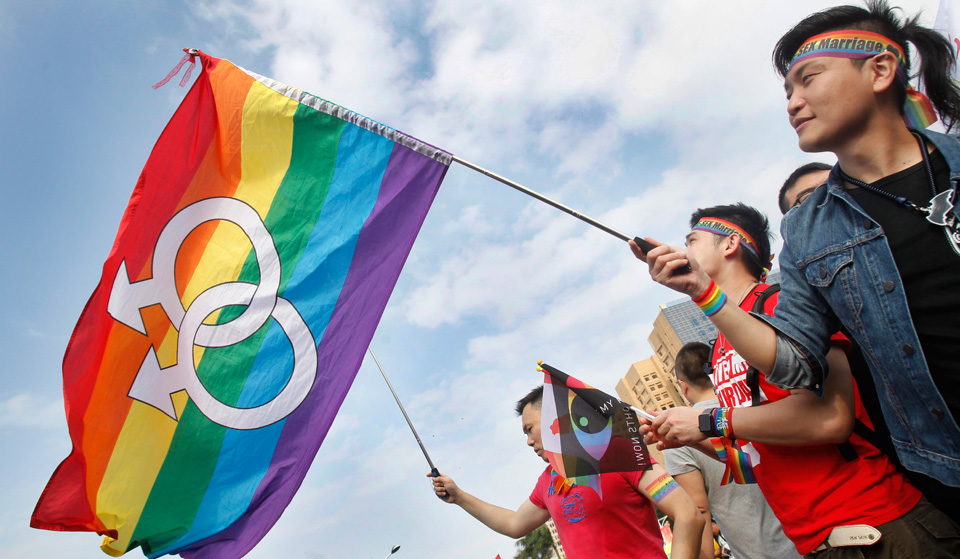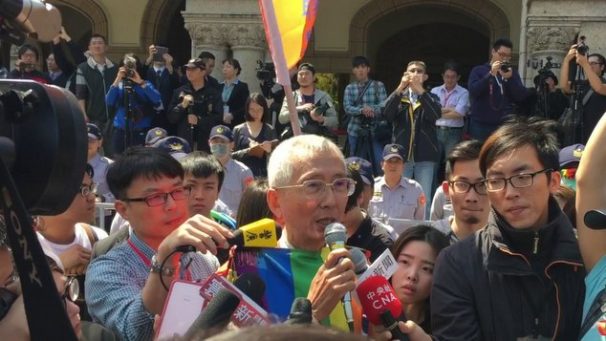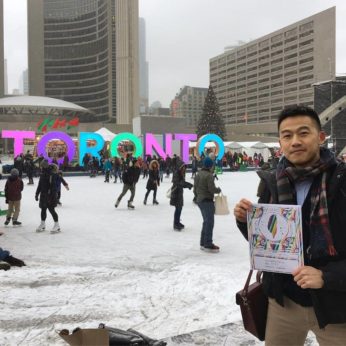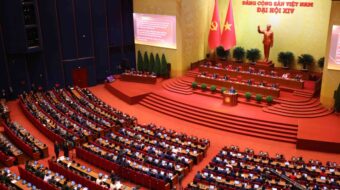
The long and sustained efforts of tireless activists like Chi Chia-wei, who has been campaigning for gay rights since he first came out in 1975, have finally paid off in Taiwan. The country’s highest court made history today when it ruled that current laws defining marriage as being only between one man and one woman are unconstitutional. Taiwan will now become the first jurisdiction in Asia to have marriage equality, setting a new bar for other countries in the region.
In a case brought by Chi and supported by the Taipei municipal government, eleven of the fourteen Grand Justices on the Constitutional Court have declared that the law prohibiting same-sex marriages violated “the people’s freedom of marriage” and “the people’s right to equality.”
It has ordered the legislature of Taiwan to amend the Family Code within two years’ time to allow two persons of the same gender to register a union. If the government does not act, the court said, couples will automatically be able to register under existing law.
Decades of struggle
The court’s decision, detailed in a press release, went further than simply ruling on the procedural right to equal treatment under the law, however; it made a strong statement on the inherent equality of people no matter their sexuality. “Sexual orientation,” the court said, “is an immutable characteristic that is resistant to change.”
The justices also revisited how sexual minorities have been treated in Taiwan in the past. “In our country, homosexuals were once denied by social tradition and custom… As a result, they have been locked in the closet and suffered various forms of de facto or de jure exclusion or discrimination.”

That kind of exclusion and discrimination is exactly what Chi Chia-wei first started campaigning against when he came out in the mid-70s as a teenager. During that time, Taiwan was still under martial law and ruled by the military dictatorship of the Nationalist Party (Kuomintang) – not a welcoming atmosphere for political activism. In 1986, Chi was imprisoned for several months when he submitted his first petition for gay marriage.
His successful lawsuit before the Constitutional Court today caps decades of struggle and was the latest of several attempts by Chi to have his 30-year relationship with his partner legally recognized.
His legal case became a rallying point for Taiwan’s LGBTQ community after the suspected suicide last year of Jacques Picoux, a French professor teaching at National Taiwan University, who had been denied the right to marry his Taiwanese partner, Tseng Ching-chao. Friends reported that Picoux had fallen into a state of severe depression when the couple’s lack of legal status denied him the right to participate in making medical decisions while Tseng was suffering from cancer. Tseng later died, and Picoux found himself with no legal claim over the home they had shared together for years.
Following Picoux’s death, the campaign for marriage equality picked up steam, with the LGBTQ movement successfully pressuring members of parliament from the ruling Democratic Progressive Party (DPP) to table new proposals to amend the Family Code.
Speaking on the case before the Constitutional Court, Chi told The Guardian earlier this week, “If it doesn’t work out this time, I’ll keep on fighting for the people and for human rights.”
The next generation
While long-time fighters like Chi Chia-wei have kept the flame of the equality struggle burning for years, they are not alone. A new, younger generation of activists has been a key part of reaching the legal finish line for marriage equality.

Ryan Chiu, a 30-year-old Taiwan national currently living in Toronto, has been working to take Taiwan’s campaign for LGBTQ equality global. Working with a group of Taiwanese living overseas, Chiu and others have been organizing rallies in major cities around the world over the last several months. He convened a rally in Toronto in December 2016 shortly after the proposed Family Code amendment passed first reading in Taiwan’s legislature.
Gathering in front of Toronto’s Metropolitan Community Church, one of the first churches in Canada to perform same-sex marriages, Chiu and members of the Taiwanese expat community emphasized a message of unity and reconciliation. Much of the opposition to marriage equality efforts in Taiwan has been spearheaded by conservative religious groups, thus splitting society on the issue.
Opinion polls show the country split 46 percent in favor of marriage equality and 45 percent opposed. “It was symbolic of the fact that religion and human rights are not contradictory,” Chiu said of the decision to host the Toronto rally at a church. “They can co-exist.”
His activism has crisscrossed the Pacific Ocean – from Toronto to Taipei and back again. Chiu told People’s World he was recently in Taiwan to take part in efforts on the ground there. He was in the capital on the day when the Taiwanese parliament’s Social Committee was reviewing marriage legislation from Democratic Progressive Party MP Yu Mei-nu.
“I arrived in Taipei at 5:00 in the morning, took a quick shower, and headed right down to the parliament building,” he said. There, human rights and LGBTQ groups had organized a massive rally of thousands to send a message to the Social Committee. “I was touched and proud to see so many people took the day off work and school to support the bill,” he said.
Returning to Toronto, Chiu hit the phones with calls to Taiwanese MPs urging them to sign on as supporters of Yu’s bill.
Today’s Constitutional Court decision now ramps up the pressure on parliament to act on legislation. “The result is a big step,” according to Chiu. “We hope MPs will follow the ruling and make the necessary changes for everyone in Taiwan.”
Outpost for LGBTQ equality in Asia
Activists are already lobbying parliament to implement nothing less than full equality when considering legislation to meet the court’s order. There are some concerns that a watered-down bill that grants something less than full, equal marriage could be passed.
The Taiwan Alliance to Promote Civil Partnership Rights, one of the island’s foremost LGBTQ organizations, said in a statement to lawmakers today, “The Grand justices have rejected discriminatory legislation…and believe that any special legislation like a ‘same-sex partnership act,’ which is not ‘marriage,’ would not adhere to the concept of equality.”
The group also reminded Taiwanese President Tsai Ing-wen that during her campaign she had expressed support for LGBTQ equality and urged her to lead her party, the DPP, in meeting the spirit of the court’s order.
Taiwan is often seen as being in the forefront in Asia when it comes to LGBTQ openness and acceptance. At last year’s pride parade in Taipei, an estimated 80,000 people were in attendance.
Taiwan’s big step forward sets a new standard in Asia at a time when some countries are seeing reversals on LGBTQ issues. In Singapore, for instance, new restrictions have been put in place on that nation’s annual LGBTQ event, Pink Dot. In the conservative Muslim province of Aceh in Indonesia, two young gay men were recently beaten in public for having sex, while 141 others were arrested in the capital city of Jakarta on trumped-up pornography charges.
Today’s ruling by the Constitutional Court further cements Taiwan’s place as the leader on LGBTQ equality issues in the region – thanks to the efforts of generations of committed activists.










